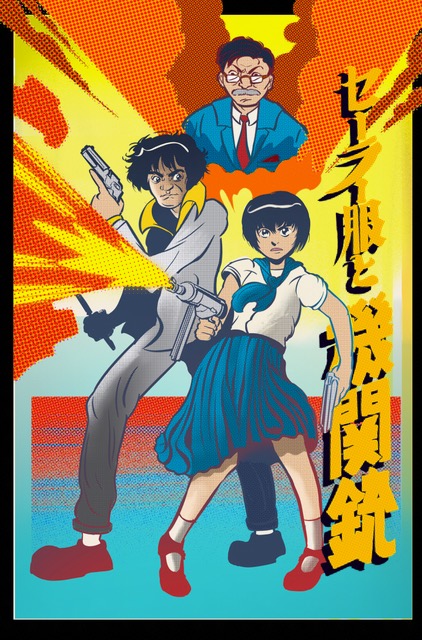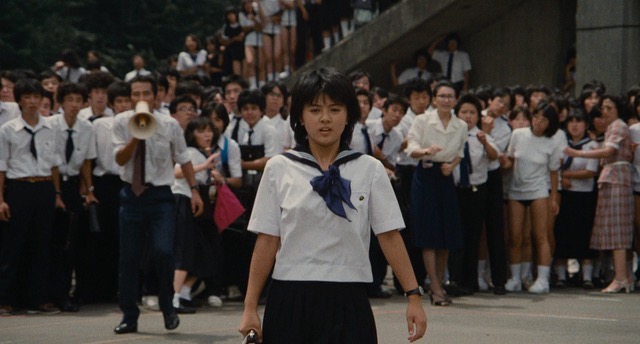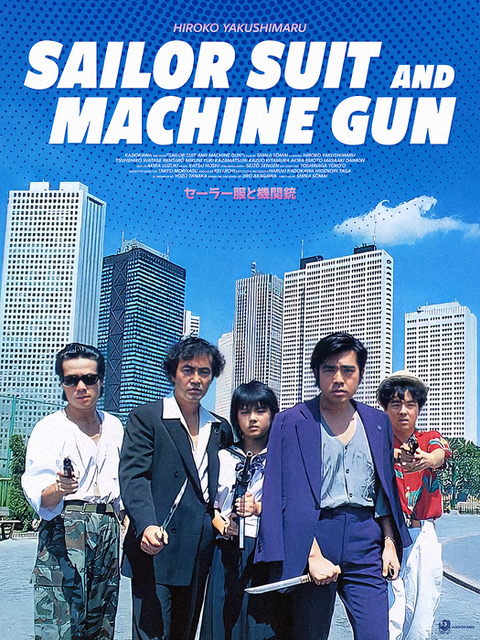| Jake Rudegeair |

Sailor Suit and Machine Gun plays at the Trylon Cinema from Friday, August 2nd, through Sunday, August 4th. Visit trylon.org for tickets and more information.
“Coming of age” always struck me as a flat phrase for something so bumpy, so relentless. It doesn’t really illustrate that slow erosion of our bodies and souls as we’re worn down by the slings and arrows of experience, cruelly and carelessly reformed over and over again (can you tell I just watched a movie about a teenager?).
Maybe the Japanese alternative gets closer to the mark. “Seishun monogatari” translates literally to “youth story.” That feels a little more mythical, doesn’t it? Universal. Like the combined colossus of all “youth stories.”
However you say it, the wonderful world of Japanese cinema is packed with titles that fit the phrase. Countless scripts explore the ambling march from innocent simplicity to weariness and suffering, typified by classic films like Ozu’s I was Born But, or Kinji Fukasaku’s unhinged masterpiece Battle Royale, all the way to modern gems like Yoko Yamanaka’s Amiko (2017). The Japanese film industry celebrates a long tradition of stories starring young protagonists thrust into the dismal environments of adult corruption, with no choice but to adapt, flee, or die. They’ll either become eternally disillusioned, or they will purify the dismal spaces with their idealism. It’s primed for good storytelling. Creative opportunities abound on a clean canvas of youth and inexperience. Not to mention, we all remember how shitty growing up can be.
At first blush, Sailor Suit and Machine Gun might get confused for a superficial entry in the coming-of-age/Seishun Monogatari pantheon. But an abiding sadness pervades from the jump. It’s present beneath even the most surreal moments, like an impromptu, buzzed-up motorcycle procession, or a nauseating stunt involving a 30-foot crane and murky industrial troughs. Yōzō Tanaka’s script catches you off-guard with futility-laced doldrums and aching confessions. The same goes for Director Shinji Sōmai’s wry, lingering camera. But the unexpected pathos works. A tragedy in a broad satire’s… well, sailor suit.

It’s a weird hang, filtered through the eyes of high school student Izumi Hoshi, played impeccably by idol Hiroko Yakushimaru. When her father dies suddenly, Izumi inherits his shrunken yakuza fiefdom. She finds herself suddenly responsible for a crew of sympathetic rogues including their de-facto leader, the coiled but kind Makoto Sakuma (a disturbed Tsunehiko Watase). Rather than let them go down in a hopeless “blaze of glory” she accepts her inauspicious crown.
One might expect some silliness to pop off at this point, given the titular sailor suit is now machine-gun adjacent. There’s some silliness to be found here and there, sure, but the rising dramatic action insists on being more melancholy than madcap. We waste away behind long, distant takes of mourning yakuza, or Izumi’s thousand-yard stare as adult depravity blooms around her. But soon, with the help of Izumi’s big heart and disarming grit, we come to understand the truth. These depraved adults are nothing more than malformed children, mangled by time and experience, longing for mother’s love perhaps, or an imagined destiny far, far away from that gangster life. There’s an especially grueling reverie of grotesque adulthood from Mayumi (played by a spectral, inscrutable Yuki Kazamatsuri).
This movie is full of long, breath-y takes that are hallmarks of Sōmai’s style. But it’s not just the jostling ten-minute shots or the cloud’s-eye-views that reflect the characters’ detachment. Sōmai puts the camera in some other strange places. Here it’s pushed in tight on a dirty, worn stairwell, paint chips curling from the plaster newel. There it’s perched on a neighboring rooftop like a raven, spying on our heroes from afar. Sōmai’s vision (and cinematographer Seizō Sengen’s brilliant eye) capture those confusing, inexact calibrations of youth, and the filth that gathers as we move through time. In his essay for the Blue Ray release of SS+MG, Aaron Gerow put it like this:
“Sailor Suit and Machine Gun is a captivating exploration of incompatibilities, of opposing terms and the liminal spaces in between them. It is the combination of not just a high school girl with violent yakuza, but realism with the fantastically absurd, the teenage virgin with adult sexuality, the high and the low, and ultimately life with death.”
Hell yes. But I think he put his finger on something fundamental. I think this is one of the core allures of the seishun monogatari, in all its universality and specificity. It’s the natural binary that forms on either side of life’s Rubicon, where we pass beyond the bliss of unknowing into the foul streets, never to return home. A good youth story draws us right back to that tension waiting quietly in our nervous system, our first memories of dissonance—the days that slipped away into figments—seen from far away through the rising fog.
Sorry, this flick gets my poetics waxing. In my defense, I was blindsided! I planned to watch a movie about cartoonish villains, broad set pieces and, well… machine guns. Sōmai and his team deliver all of the above, just not the way you’d expect.
But don’t take my word for it. Like anything worth experiencing for the first time, you’re just going to have to see for yourself.

Image sourced from posterspy.com
Edited by Olga Tchepikova-Treon
